#ttrpg dev
Explore tagged Tumblr posts
Text
Also help raise money to fight for trans people, and get some rad games in the process!
#indie ttrpg#ttrpg#ttrpg dev#ttrpg design#fuck conservatives#trans rights#trans#fuck jkr#indie ttrpgs#the problem is capitalism
1K notes
·
View notes
Note
Y'all state in the Eureka rulebook (at least the version I have) "In our experience, the more preparation,the better, no matter the genre." I was wondering if you've expanded on that anywhere? I've been rambling in my drafts about how different games talk about prep, including PbtA games which often state outright that you should only make limited preparations.
Yeah this is something that it would be a good idea to expand upon, because “GM prep” is word that has been so diluted and corrupted by D&D5e and its toxic critical role play culture, where “GM prep” means “they will do this, and when they do, the music will be timed just right and the battle map will be so impressive, etc.” PBTA is telling you to avoid prep because it doesn’t want you doing that kind of prep (and no good RPG does). This can work for PBTA for a number of reasons that I actually don’t want to get into in the interest of time but it has a lot to do with the pure genre emulation and the limitedness of the playbooks.
Eureka: Investigative Urban Fantasy, however, cannot get away with this because it is both a much more expansive “toolbox” game and because it is explicitly a mystery-investigation game. There are many other games that do also really benefit from the type of prep that Eureka wants from its GMs, such as dungeon crawlers, but Eureka needs it the most.
But the kind of prep Eureka wants isn't “they will do this and when they do it will be perfectly timed and look so impressive,” it is “what if they do this? What if they do that? What if they do some other third thing?”
A Eureka GM needs to have something ready for the shed behind the house, in case a PC decides to go to the shed behind the house, because this is a mystery game. You can’t just improv it, if you make something up on the spot, then and that thing doesn’t perfectly adhere to the facts of the case, the case can be ruined. That’s why we push for using adventure modules so much, because they’re literally designed to do that prep for you.
TL:DR
TTRPGs are games where anything can happen, so instead of being extremely meticulously prepared for one possibility, a good GM is moderately prepared for a wide variety of possibilities. In a game where “the facts” not 100% lining up doesn’t fully matter or isn’t likely to be pried into, you can get away with lower prep in each of your possibilities you’ve prepped for, but in a game where “the facts” and tiny little details are all that matters, you should have a high level of preparedness for each possibility, and the best way to do that is to use an adventure module.

#game design#ttrpg community#ttrpg design#rpg#ttrpg#indie ttrpg#ttrpg tumblr#eureka#eureka: investigative urban fantasy#ttrpg dev#eureka ttrpg#tabletop rpg#tabletop roleplaying#game master#dungeon master#pbta#powered by the apocalypse#dnd#dnd5e#dungeons and dragons#dnd 5e
419 notes
·
View notes
Text
Let’s have a talk about malleability and TTRPGs
I come from a theatrical background. Did theatre for most of my life, majored in stage management, the works. Plays and the way they function are deeply embedded in my psyche.
So when I design and play games, I come from that theatrical framework.
Now — on the one hand, you have Shakespeare. Fairly universal stories, yeah? You can cut it up, switch things around, put it into a multitude of settings. And it still works! King Lear in space. Romeo & Juliet as pirates. The Scottish Play (old habits die hard) done avant-garde. It’s malleable!
On the other end, you have hyper-specific plays about hyper-specific themes. Angels in America. The Laramie Project. Venus in Furs. Etcetera. You can’t remove the core themes, change the setting, switch scenes around: without erasing the core intent of the work and the story it’s trying to tell.
And in the middle, you have plays that are somewhat malleable. Almost, Maine, for instance. It’s made up of vignettes; you can do only some of them, if you so choose. It’ll still have the same impact.
I believe TTRPGs exist on a similar spectrum.
You have systems that can accommodate many different genres or play styles. People play dnd this way. Pathfinder comes with pre built settings that run the gamut
PbtA games are hyperspecific. Monster of the Week is about, well, monsters of the week. Remove that, and you’re playing a different game.
Call of Cthulhu can be set in any time period, but you still have to be up against Eldritch horrors. If you’re able to fight the monster, that’s a different intent than the game was built for.
Lyric games are akin to 4.48 Psychosis (everyone should read that, by the way, it’s a master work of avant-garde theatre).
And so on and so on.
Nothing is better or worse than any other. It just exists, on a spectrum, in the same vein as playstyle or crunch do. Everyone has their preference.
But with any game, there comes a point where you’re no longer playing that game.
10 Things I Hate About You is not The Taming of the Shrew, though it were based on it. There’s a limit to even the most forgiving game to where you’re no longer playing that game, but something you and your table have created for yourselves.
You can’t take the queerness or religion out of Angels in America. That’s a different play altogether.
It’s a spectrum.
I choose to design in the specific. That’s what resonates with my brain. You may want to play something that’s capable of handling more universal narratives. That’s fine too!
But we can’t ignore the bones of the system, and it’s incorrect to say we’re putting on Hamlet, when we’re actually performing The Lion King.
So: the Theory of Malleability (working title).
I don’t have a great end to this. Just musings. But I hope it makes sense to you too.
#ttrpg#indie ttrpg#ttrpg thoughts#ttrpg theory#ttrpg dev#look sometimes you say some shit and blow your friends mind and a day later decide to post on social media past midnight and see if it lands
386 notes
·
View notes
Text
I got a neat book today.

And now if you'll excuse me I'm going to sit on the floor with dry erase markers and blocks and dice and index cards and try some stuff.
492 notes
·
View notes
Text
Alongside the wonderful Fear System in Eureka (I refuse to call it sanity as that would be a disservice) I've been looking through it more to better rip it apart and figure out how it works. The reason for this being how deeply connected I feel Horror and Mystery are as genres. Hell they are so close we invented a whole microgenre about it (thrillers) that became its own genre seperate from the other two.
Anyway, actual point, something that Eureka does that I find interesting is Denial of Information. Specifically when it comes to knowledge about other characters. Alongside that it doesnt ask for that just for Vibes. There are textual reasons to keep info hidden from eachother, just as there is irl. Its also doing this is a way that has different motive from other systems I've seen that have similar requests (ie Triangle Agency). Monster characters and others dont want themselves to be revealed for obvious reasons that are relevant because their world is as similar to our own as one can get while still being paranormal fiction.
To me, Eureka showcases how much of living in society is hiding yourself from society and others around yourself. Even the ones you say you trust. And that makes me wonder as a TTRPG designer: what other messages would be bolstered or spoken on by Denial of Information? What are people willing to do to find things out? What happens when you let the unknown and a lack of information come into your games?
#eureka: investigative urban fantasy#eureka#ttrpg#ttrpg game design#ttrpg dev#horror#mystery#thriller
120 notes
·
View notes
Text
Reading @anim-ttrpgs's Death Bed and an evil smile slowly grows across my face as each of the mechanics click into place. I can't quite explain, but I have never had an experience like reading an ANIM game. As a chronic GM my mind instantly fills with ways to push these mechanics in fun ways to challenge players. The games really justify themselves in such a way that you feel your own comprehension of TTRPGS as a medium expanding with each turn of the page. It's an absolute TREAT to read!
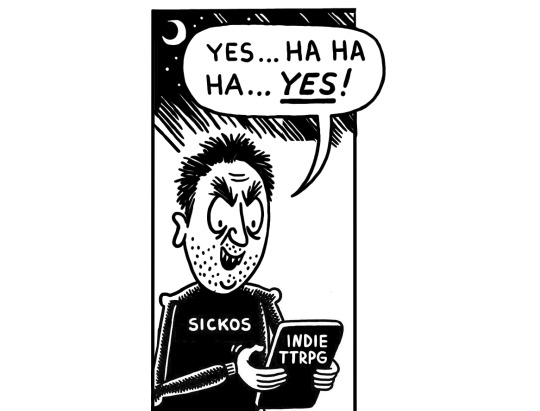
If you're interested, Eureka is the place to start, it's the most finished, and is sort of required reading for the other less finished games.
#eureka#eureka ttrpg#tabletop rpg#indie ttrpg#eureka investigative urban fantasy#eureka moment#TTRPG#ttrpg community#roleplaying games#tabletop#ttrpg design#ttrpg dev#dnd#5e
95 notes
·
View notes
Text

prototyping a descended from the queen game based loosely on phillip pullman’s his dark materials trilogy to get it ready for a playtest next week
72 notes
·
View notes
Text
The Core - A Setting Guide
The Core is a place deep, deep underground. Some might say impossibly deep.
While its societies may look familiar, dig a little deeper and one will find they differ greatly. Every person here is part of a rich tapestry, a blending of many species and constructs and their cultures.
Hey there, as part of the Tiny Worlds TTRPG Jam, I've assembled some of my worldbuilding into a 7 page setting guide! Get down to the Core for some pulpy retro-future sci-fi adventure and intrigue!
Within, you'll find information on:
The Core overall
DownTown, a place of tinkering and adventure
The Haydrian Mass Foundries, a city-factory of industry and spirituality
The Shattered Pillar, a place where reality itself has fallen apart
The Nexus, a secluded machine hivemind
I had a lot of fun working on this, and making the section marker art! Here are all five collected together:
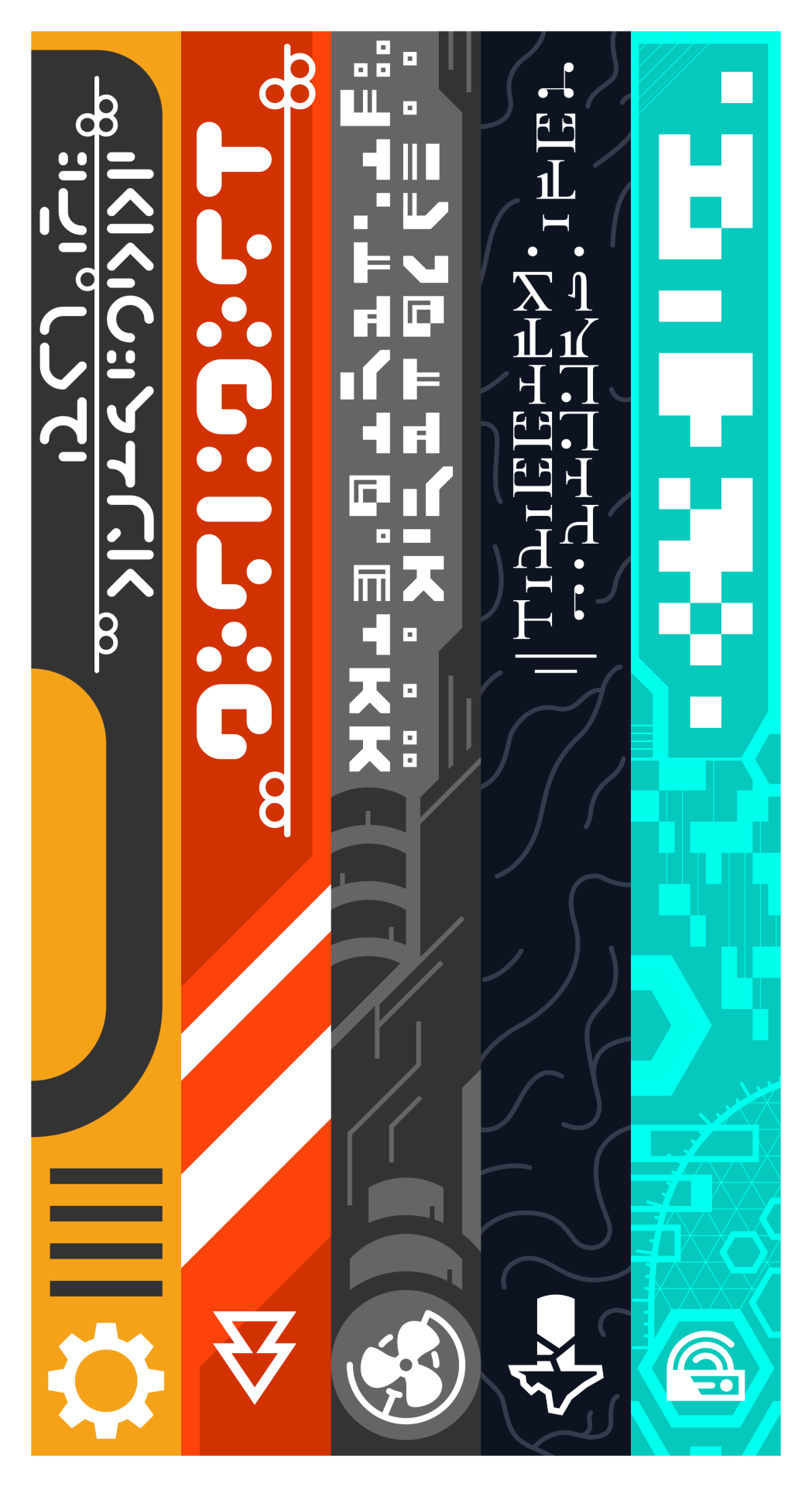
#deric games#ttrpg#ttrpg dev#indie games#itch.io#my art#my 2d art#game jam#tinyworldjam#The Core#the core mechanics#blaseball#science fiction#original setting#pulp adventure#The Haydrian Mass Foundries#The Shattered Pillar#The Nexus#drone
118 notes
·
View notes
Text
throwing caution to the wind here and guessing the fucked up tv shows and weird ttrpgs website might enjoy a weird ttrpg i wrote inspired by one of my fav fucked up tv shows. :)
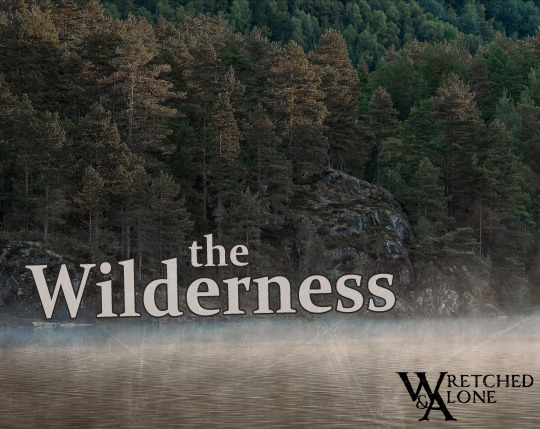
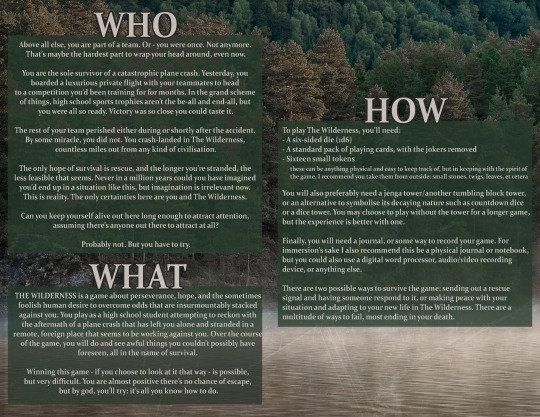
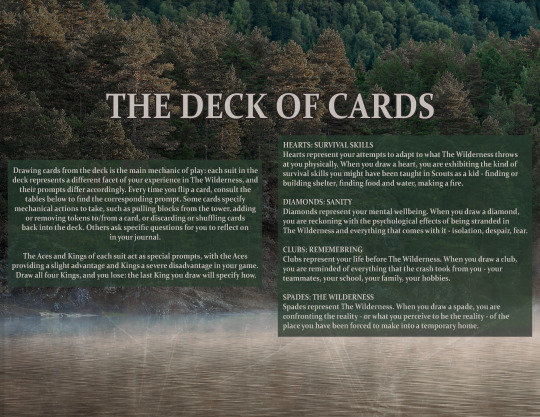
the wilderness is a single-player journaling rpg made with chris bissette's wretched and alone system in which you take the place of the sole survivor of a horrible accident leaving you stranded in a strange and dangerous place. (obviously, it's very inspired by things like yellowjackets and lost. you will find many fun little references within.)
it's now up on itch.io if you want to spend a couple hours putting yourself through the horrors at the mercy of a deck of cards! there should be some community copies up, but if you want a copy and can't afford it for whatever reason, shoot me a message :)
#indie ttrpg#ttrpg#ttrpg tumblr#ttrpg community#yellowjackets#the wilds#ttrpgs#survival horror#horror rpgs#ttrpg dev
134 notes
·
View notes
Text
TTRPG Inspirations
There are 3 games that served as major inspirations for Where the magic never ends? . Let me present them and their influences
Hunt by Spencer Campbell

Of course this one hits the list, it is where i took the system. Hunt is the first Lumen game from GilaRPGs to go diceless. A sort of Lumen 1.5. After 2 years of not slaying the NaGaDeMon (game jam), I decided to not create the system but do a hack instead. And this game was in my mind a lot by in autumn 2023. Along the way, I made it more pacific, taking inspiration for the players moves in the monsters moves from Lumen games' bestiaries. But the core, the diceless, 3 ressources management system is in there. Now that Lumen 2.0 games are available, I may revise some of the design to adapt it.
Here we used to fly by Kurt Refling & Ian Howard
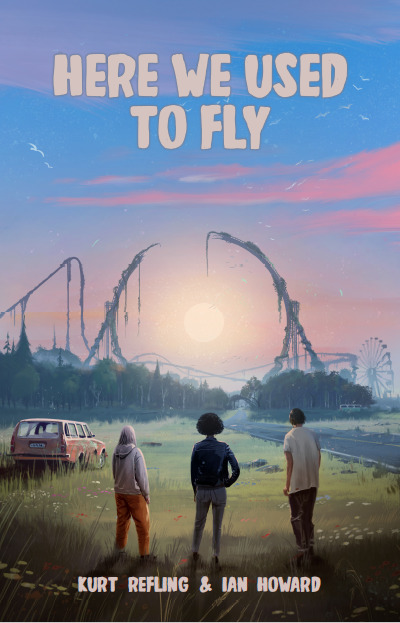
Well the cover should give an inkling for what I took there... This is a game about theme park, about childhood memories when the park was active and adult visiting the abandoned parc the night before it is destroyed. I love theme parks. This is where the abandoned theme park and childhood wonder come from.
The Happiest Apocalypse on Earth by Christopher Grey

The other major inspiration for the theme. A game where animatronics are alive, snow white is a vampire, costumes aren't costumes, ice cubes from the ice where Dagon is imprisoned make people go tentacles and danger wonder lurks everywhere. Also Disney songs references! Yeah! The concept here is "What if Disneyland was controlled by Cthulhu?" Also I really wanted to just copy paste the park creation part.
As for the "answer a question with a narrative effect to activate a move" thing... I honestly don't remember where i found this idea...
You can find my game here on itch :
#ttrpg#tabletop rpg#where the magic never ends#coaster mages#ttrpg dev#ttrpg devlog#ttrpg design#indie ttrpg
78 notes
·
View notes
Text
Announcing: Restful Actions
(It's here. You can go get it now!)
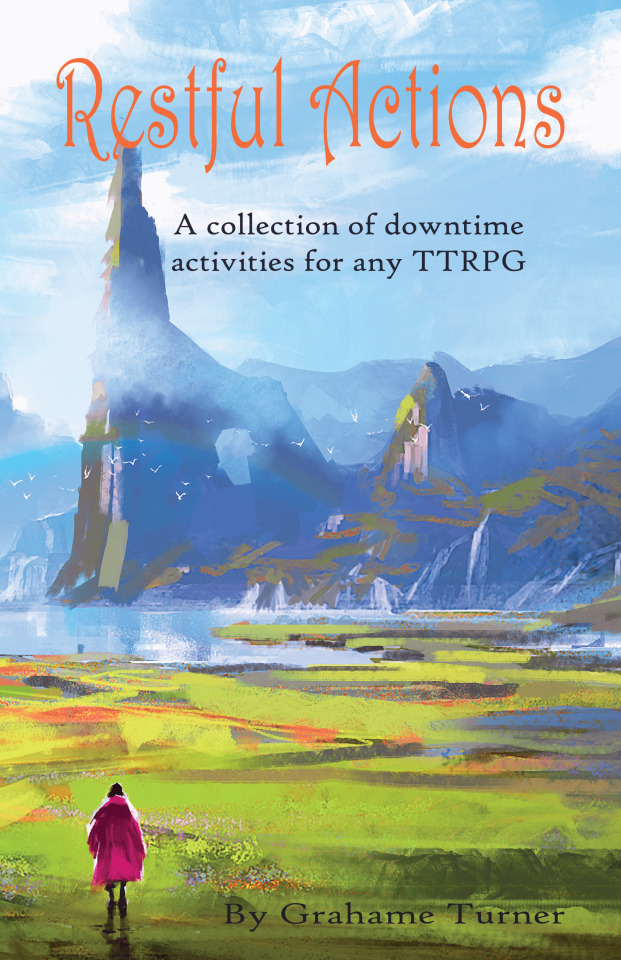
Restful Actions is a collection of 10 minigames for downtime periods in any TTRPG. They're designed to help players resolve character conflicts, complete goals, heal or explore, and take much shorter shopping trips. (You can, in fact, download the shopping trip minigame as a demo!)
For GMs, the goal is to give you a break, so you can start preparing the next Big Event. The minigames invite players to fill in some details of the world, creating shops, landmarks, even creatures.
You can pick up your copy here:
I've talked about this thing in more detail here:
#understory games#indie ttrpg#ttrpg dev#ttrpg design#ttrpg#ttrpg add on#system agnostic#scifi rpg#fantasy ttrpg#dnd#indie ttrpgs#down we go#rpg#rp#osr#osr RPGs#ai is a plague
1K notes
·
View notes
Note
If any of y'all had tips for aspiring TTRPG creators, what would they be? I'm hosting a "How to Make your own TTRPG" panel at a con this weekend, and anything to show folks from a fellow indie studio would be great!
Yeah a bunch. Each one of these could basically be its own post, but here are the condensed versions.
Social Media
You need social media. No one will ever hear of your game without a strong social media presence. And as much as it sucks, your best bet is probably tumblr. It’s the only populated social media site that allows your posts to be widely circulated without you having to pay, and also long form enough to actually include information. I dedicate one day a week entirely to social media and that’s just about the only reason we make any money at all.
Also, when using tumblr, the first five tags you put on a post are the most important, those are the tags that make it show up on people’s dashboards. The first twenty tags are the ones that make it show up in search results. Don’t put the name of your game in the first five tags generally, because if no one has heard of it yet, no one is following those tags.
Don’t Paywall Your Game
You deserve to be paid for your work if you indeed did any work at all (we’ll get to that), but that just isn’t the world we live in. Unless you have an advertising budget to essentially trick people into buying a game that might end up being crap, you need something to prove that your game is worth spending money on. Without an advertising budget, that proof has to be your game. Setting your game to pay-what-you-want, or providing “community copies,” lets people try your game before they buy. Plenty of people will buy up-front when given the option, and others who can’t afford it at that moment will download it for free then come back and pay later. Some people will never pay, but what that means for you is that they either never experience your game, or they pirate it. People experiencing your game, showing it to their friends, and talking about it is one of the most valuable pieces of advertisement you can ever have. It will ultimately lead to more people who are willing and able to pay learning about your game.
Start Small but Not Too Small
Do not make a one-page game for your first game. Do not be like us and make a 700-page game for your first game. Try to aim for something between 20 and 200 pages, especially if you’re one person or a small team.
Play and Read a lot of RPGs or Your Game Will Suck
Would you watch a movie by a director who had only ever watched one movie? Would you read a book by an author who had only ever read one book? Hell no, those would suck.
Read many rpg rulebooks, from many different genres and decades, play as many of them as you can (by the rules) to understand how the rules work and why they’re there. This will give you the creative tools you need to make something that isn’t just a weaker version of the last RPG you played. No, listening to "actual plays" does not count.
Most actual plays stray significantly from presenting a regular gameplay experience in favor of an experience that is entertaining for an audience. If you want to learn martial arts, you should be watching martial arts tournaments, not WWE.
If you want an actual play podcast that has my “actually mostly presents a real gameplay experience” approval, try Tiny Table.
If you say you don’t have time to read rulebooks, then you don’t have time to design a good game. Studying is part of the process of creating. If you don't, you won't even know about gleeblor.
This will let you know whether your "innovation" is more like "Cars don't need to run on gasoline!" or "Cars don't need crumple zones and airbags!"
The Rules Matter, So Design with Intent
The rules matter the rules fucking matter holy shit what you actually write down on the page matters I can’t believe this is actually the seemingly most needed piece of advice on this list. The. rules. matter.
Design your game to be played in the way you designed it. The rules affect the tone and genre of your game, they affect the type of people PCs can be and the kind of stories that will result from gameplay. Bonuses encourage PC behaviors, penalties discourage PC behaviors.
Do not fall for the trap of “oh well people will just play it their own way based on vibes anyway so it doesn’t matter what I write the rules to be.” Write that you wrote this game to be played by the rules and that significant changes to the rules mean that players are no-longer playing the game you made. Write like you deserve for your art to be acknowledged by its audience. If you don’t, then there is no point in anyone playing the game you made, because if the person who wrote it doesn’t even care what the rules say, why should anyone? The people whose “playing” of TTRPGs consists of never opening the rulebook and improving based on “vibes” will still do that no matter what, but the people who would have actually tried to engage with your game will find that it sucks if you don’t even care what the rules are yourself.
Playtest
You need to playtest your game if you want it to work as intended. You need multiple sets of eyes on it. If you don’t have the opportunity personally to do so, just release your game anyway with the acknowledgement that it’s unfinished. Call it an alpha or a beta version, and ask for people that do play it to give feedback, then update and fix the game based on that feedback.
Ignore Feedback
Most people do not have any game design credibility, perhaps least of all TTRPG players. You do not, in fact, have to listen to everything people say about your game. Once you ask for feedback, people will come to you with the most deranged, asinine, bad-faith “feedback” you can imagine, and then get really mad at you when you don’t fall to your knees and kiss their feet about it. You do not need to take this feedback at face value, instead you need to learn to read between the lines and find out which parts of the rules text are being misinterpreted by players, and which incorrect assumptions players are making about your game. Then, you update and improve the game by clearing those up. Only like 30% of “feedback” you receive will actually be a directly helpful suggestion in its own right at face value.
You can’t please everyone, and shouldn’t, so appeal to the people who actually like your game for being what it is, not the people who don’t.
Read Eureka: Investigative Urban Fantasy
Yeah this one sounds self-serving but hear me out. Eureka: Investigative Urban Fantasy is as much a treatise on TTRPG game design as it is a game itself. When it presents mechanics and rules, it tells you what they are, why they are, how they are, and what you’re intended to do with them. This makes it an excellent example to read for anyone wanting to get serious about game design and learn how TTRPGs tick under the hood, and an excellent example of a TTRPG that expects players to play it the way it was written to be played, and why that is a good thing. Also you can download it for free.

#ttrpg tumblr#ttrpg design#indie ttrpg#ttrpg community#ttrpg#ttrpgs#ttrpg dev#game design#game development#indie dev#indie games#game dev#content creator#indie ttrpgs#actual play podcast#tiny table#ttrpg podcast#actual play#dnd#d&d 5e#rpg
262 notes
·
View notes
Text
Poisoned Apples 1.0 Release
Well here it is, my first published ttrpg, I plan on making the document prettier and more organized with illustrations but as it'll be in a game jam bundle I wanted it out in a playable state in a timely manner. I hope all of you fucked in the head girlies who dont leave their houses enjoy it, I made it for you, I made it for me, I made it for every magical girl that probably should've gotten more therapy and head. Good luck.
#Poisoned Apples#ttrpg#magical girl#tabletop roleplaying#table top role playing game#indie ttrpg#ttrpg dev#ttrpg design#powered by the apocalypse
40 notes
·
View notes
Text
not to get anyone too excited
...but Violet Core has 4 and a half new playable X-10s incoming and I've started sketching out the much desired Handler playbook from the stretch goals.
56 notes
·
View notes
Text
I've just revamped my TTRPG "The Trains of the Glorious Republics of the People"

If you enjoy TTRPGs where you play as a train crew in a fictional 1930s totalitarian state then this is the TTRPG for you. The TTRPG now has artwork and a fresh new layout. I hope you enjoy it as much as my friends and I had making and playing it.
#trains#ttrpg#indie ttrpg#tabletop games#ttrpg community#tabletop#ttrpg dev#tabletop roleplaying#indie rpg#locomotive
55 notes
·
View notes
Text

While we're in vacation mode for the holidays, have a Genmon! This is Spinnatick, a clockwork spider whose origins are unknown and how they've managed to procreate and proliferate around Hayle is even more unknown! This is just one of one hundred Genmon you can find in our Monster Catcher inspired TTRPG, A Monster's Tail!
#five points games#indie ttrpg#pbta#ttrpg design#ttrpg art#a monster's tail#ttrpg dev#fakemon#pokemon art#pokemon
62 notes
·
View notes